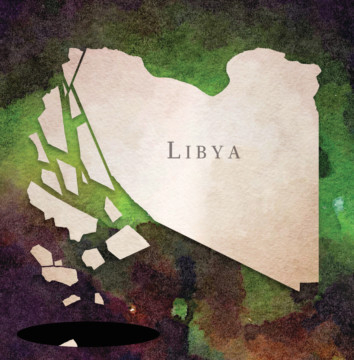
On October 12, 2013, I had written in The Views section of Gulf News about a trip that took me to Tripoli, Libya, where I met a well-established businessman who had just returned to his country from exile in London. He was fully optimistic that the then overwhelming trouble would end and Libya would eventually stabilise. He had said: “We will take off again once we, Libyans, finally decide what kind of political system we really want.”
The man, in his 50s, was returning to his native city from the tranquillity of London with a mission: To rebuild the family business his father was forced to desert when he had to run for his life in total fear of the vicious ‘People Committees’ widely unleashed by the then ruler, Muammar Gaddafi, in the late 1970s and early 1980s. The Libyan man was equally full of hope and confidence about Libya’s future. I wished him well and we agreed to keep in touch.
I left him with a lot of anxiety that day. Just a week back, the country’s prime minister, Ali Zeidan, was seized in the early hours while still in his bed. The kidnappers were reportedly men belonging to a former rebel group ‘loosely affiliated’ to Libya’s Interior Ministry, known as the Libyan Revolutionary Operation Room. Zeidan, after all, was legitimately elected and was officially inaugurated earlier that year.
The other major incident that happened earlier that same week was when US Delta Force Commandos successfully managed to abduct Al Qaida affiliate, Nazih Abdul Hamid Al Ruqai, better-known as Anas Al Libi — after almost three decades on the run. Al Libi is believed to have been close to Osama Bin Laden and accused of taking part in the deadly bombing of the two American embassies in West Africa in 1998.
The immediate interpretation was to connect the two incidents, as Zeidan’ seizure was suggested to be a reaction to Al Libi’s abduction. Shortly after these two incidents, many global businesses, including giant American and French oil companies, began preparation to hastily move to neighbouring Malta to carry on with their operations.
These incidents should have been considered as clear indications of what direction the country was taking. The writing was clearly there on the wall.
Since late 2013, the security decline and political chaos in Libya have rapidly increased, giving the world a clear message that the country was on its way down to the abyss. In fact, my Libyan friend has since returned to London. He phoned me last November and explained how he miraculously managed to escape from Tripoli. “Libya,” he said, “is now the most dangerous place on earth.”
Libya has basically become now the second-most chaotic place after Syria, for attacks on neighbouring countries, particularly Tunisia and Egypt, as well as Europe. It is now absolutely clear that Daesh (the self-proclaimed Islamic State of Iraq and the Levant) has established for itself an ‘enclave’ around the coastal city of Sirte. It is feared this new development will provide it with valuable facilities to train, raise funds (from sale of oil) and plan attacks in the neighbourhood and possibly across the Mediterranean.
Somehow, in the mid of the chaos, Daesh managed to cease, last year, a strip of land around the city of Sirte and it seems the first scouts to have arrived from Syria and Iraq, relocated themselves there. So far, Daesh has succeeded in launching attacks on Libyan cities, including Tripoli and Benghazi, as well as some specific oil installations.
It is estimated that Daesh has been able, until now, in a relatively short period, to recruit between 4,000-6,000 extremists, mostly from Tunisia and some from Iraq, Sudan and Egypt. Hundreds others are being recruited from impoverished sub-Saharan African countries to the south, induced by large cash payments. Daesh has now managed to create a most convenient second base, after Syria — a task it had started in 2014.
With the absence of any central authority in the country, Libya is currently swamped with sophisticated weapons over its vast territories, with Daesh recruits freely moving around and training in the country’s north. Libya’s geographic location makes it now as dangerous a place as Syria to its neighbours. In fact, its proximity to southern Europe, makes its threat much more potent than previously thought. With its base in Sirte, it is geographically closer to the West than its bases in Syria’s Raqqa or Iraq’s Mosul.
On Libya’s western borders, Tunisia has taken drastic precautions by completing the first part of a security barrier of wide ditches in an attempt to protect itself from terrorist attacks similar to the ones carried out last year in Tunis and Sousse. Whether this will provide Tunisia with the required security cover remains to be seen. The longest border Libya shares to the west is with Algeria (989km), but the authorities there have their own fight with Islamists for many years, within their borders and are believed to be better-prepared to face Daesh.
Egypt, to the east of Libya, is also a potential target for Daesh, but President Abdul Fattah Al Sissi’s government is waging its own war against the Islamists in the country.
So, if the current situation continues, Libya will rapidly become as dangerously chaotic as Syria.
Mustapha Karkouti is a former president of the Foreign Press Association, London. You can follow him on Twitter at www.twitter.com/@mustaphatache








